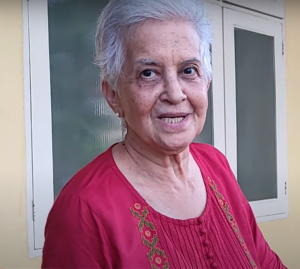 SATYÁ DA COSTA FERREIRA, who lives in Miramar, Panjim, Goa, fondly remembers the days that her family spent at Bogmaló beach in the taluka of Mormugão.
SATYÁ DA COSTA FERREIRA, who lives in Miramar, Panjim, Goa, fondly remembers the days that her family spent at Bogmaló beach in the taluka of Mormugão.
As I was talking to Óscar on the phone, we spoke about vacations, especially the type of vacations we had in the past….
We were a large family and studied at Liceu Nacional Afonso de Albuquerque in Panjim. After our classes and exams, we would go with our parents to our ancestral home, in Loutulim, and from there, after a few days, to Bogmaló, where we would spend about two and a half months.
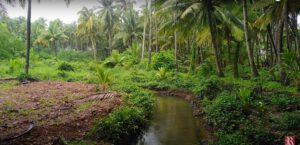 In Bogmaló, life was different. We children went to the beach and our parents and aunts, who were there with us, had other tasks. In Bogmaló, our family had an estate with palm trees and, so we took advantage of this vacation time to have coconut tree plucking. In the initial days of the plucking – particularly on the first day – our father took me and my older sisters along – they were three and six years older than me – to see, to learn how they did it. He then asked us to make a note of the number of coconuts, on a palm leaf, in Roman numerals. I liked these walks with my father, but I was simply too afraid to cross the different parts of the estate on trunks of coconut trees: they were trunk slits placed on either side; and I was always too afraid to cross them.
In Bogmaló, life was different. We children went to the beach and our parents and aunts, who were there with us, had other tasks. In Bogmaló, our family had an estate with palm trees and, so we took advantage of this vacation time to have coconut tree plucking. In the initial days of the plucking – particularly on the first day – our father took me and my older sisters along – they were three and six years older than me – to see, to learn how they did it. He then asked us to make a note of the number of coconuts, on a palm leaf, in Roman numerals. I liked these walks with my father, but I was simply too afraid to cross the different parts of the estate on trunks of coconut trees: they were trunk slits placed on either side; and I was always too afraid to cross them.
In Bogmaló, people basically had two professions: one was the production of palm wine and the other was fishing. So, in each house, they all had a still [piece of equipment used to make strong alcoholic drinks by a process called distilling], and early in the morning, at noon and in the evening, the tenants came there, to climb the coconut trees that they had taken on lease from the owners. And we really liked to see the men climbing the coconut trees with great agility.
Their other profession was fishing. Our house was located on the beach, and on certain days there was a lot of commotion on the beach when fishermen cast their nets. There could be anything like 10, 20 or 30 fishermen. And what we liked was to see them pulling nets loaded with fish: what variety and what abundance!
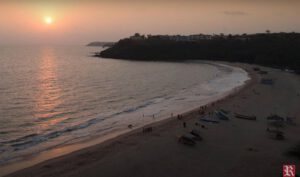 Often, we were very sorry that we didn’t have anyone to play with us on the beach, no other children of our age to play: it was just the aunts and us, three sisters, on the beach… Today, when I go to Bogmaló there isn’t even a spot where I can be all by myself – there simply isn’t!
Often, we were very sorry that we didn’t have anyone to play with us on the beach, no other children of our age to play: it was just the aunts and us, three sisters, on the beach… Today, when I go to Bogmaló there isn’t even a spot where I can be all by myself – there simply isn’t!
At home, the aunts and Mother kept busy with other tasks: one of them was making broomsticks for brooms to be used all year round. The other occupation there was to watch the labourers dehusk coconuts. These were later taken to the village, to Loutulim, where oil was extracted. And I greatly admired the ease and agility with which they peeled hundreds of coconuts.
What else did they do? They made a provision of salted fish in Bogmaló, and it was stored for the monsoon, when there was a shortage of fish.
Now, on the beach, we children played in the sand and in the water, and the aunts bathed in the sea water. It was thought at that time that a bath in the sea would prevent typical monsoon ailments in the elderly.
And that is how the two and a half months passed and we returned home in the same way to get ready to resume our classes in Panjim. Those were our vacations and our mudanças!
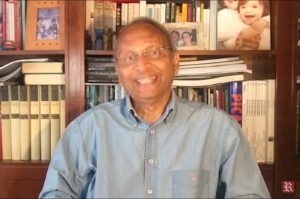 JOSÉ FILIPE MONTEIRO, who lives in Lisbon, recalls the spots where he spent his vacations with family and friends in the talukas (concelhos) of Ilhas and Salcete, Goa.
JOSÉ FILIPE MONTEIRO, who lives in Lisbon, recalls the spots where he spent his vacations with family and friends in the talukas (concelhos) of Ilhas and Salcete, Goa.
It is with great pleasure that I send this statement to your Renascença programme.
You asked me to talk about mudanças – vacations – and, really, this is a very grateful memory: after all, recordar é viver, to remember is to live, or as I usually say, we are our memory!
Mudanças! Holidays, or vilegiatura, vacationing, as we used to say in Goa – and even the newspapers carried the news of where we went on a mudança or this vacation.
Classes in Goa ended in February, and in March we had the exams. April and May were the summer vacation months par excellence.
And what did this mudança imply? It meant leaving Panjim city and spend a few weeks on a beach closeby. In Panjim, that could be Caranzalém beach, or Calangute. It was rarer for us, residents of Panjim, to go on vacation to Colvá beach or to a beach in Salcete. And I remember that, for this small distance of 3 or 4 km, we even took along some furniture; but it was very interesting.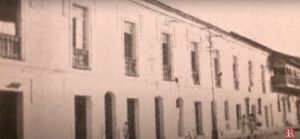
I remember with great nostalgia one o f the vacations I spent in Caranzalém. We had a Portuguese soldier as a neighbour who, after all, was trying to teach me how to swim. Of course, it was more about diving and drinking lots of sea water!
I also remember fondly my trips to my paternal grandparents’ house: from there we would go to Velção beach. This meant going in a van, with all the cousins.
But the most interesting thing about these vacations, these long holidays, was that we went in droves looking for wild fruits; it was our meeting with cousins; and then we sat at the big, long dinner table.
Anyway, one of the typical things about Goa were these mudanças, these vacations, which I think were a mark of a society – I wouldn’t say that it was the whole of society could change – there were a few, more privileged, who had the financial capacity to make these changes.
But, anyway, I think you do very well to remember those moments that were part of our entire past. I think that nowadays things don’t work the same way.
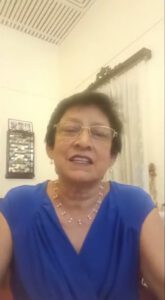 IVETE SILVEIRA BARRETO, who lives on the picturesque island of Divar, Goa, speaks of vacations spent in São Matias, Benaulim and Calangute, in Ilhas, Salcete and Bardez talukas, respectively.
IVETE SILVEIRA BARRETO, who lives on the picturesque island of Divar, Goa, speaks of vacations spent in São Matias, Benaulim and Calangute, in Ilhas, Salcete and Bardez talukas, respectively.
I have fond and vivid memories of my childhood and teenage days, especially of the great enthusiasm with which we prepared and went for the so-called ‘Mudança’ (holidays), in the months of May and October.
When I was a child our mudança used to be at my paternal grandparents’ house in São Matias, on the island of Divar, or at my maternal grandparents’ house at Bairro Povoação, close to the Monte in Benaulim.
To go to Divar, we had to travel by lancha (launch) or the so-called gasolina (a mechanised boat) which carried around 25 to 30 seated passengers. It used to leave from the dock at Navegação in Panjim and go directly to Vitogem in Divar, where all the passengers would alight. From there we had to walk for around 15 minutes, to reach the house. In the event of missing the gasolina – which happened only rarely – we would have to travel by carreira (bus) from Panjim to Old Goa and get down at the junction, near the post office, and walk to ferry point, through the Viceroys’ Arch. In those days, there was no ferry-boat, so we had to cross the river in a canoe rowed by two boatmen. After crossing over, the walking distance to the house would be two or three times more than from Vitogem, depending on our pace. Somehow, we enjoyed the trip and never felt tired.
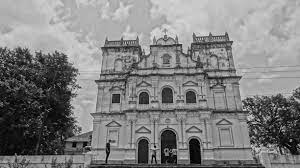
As for the journey to Benaulim, it was also by carreira or bus from Panjim to Margão and another to Colva. We had to get down midway, near the Monte, and walk for just 10 minutes.
Our daily schedule in both these vast and roomy houses was more or less the same.
Breakfast was limited to bread, chapatis or kailoios with butter, cheese, mangada (mango jelly) or guava jelly; the compulsory midmeal, around 11.00 a.m., consisted of pez (canjee) with attoiloli koddi (condensed curry of the previous day), a variety of chutney (pickles) and fruits like mango and jackfruit.
Besides the delicious rice-curry, with tasty river fish and prawns, there was a variety of dishes made with beef, chicken, duck, pigling and pork – from livestock reared at home. In those days, there were no refrigerators and no electrical gadgets. Ingredients were ground on the grinding stone and cooked in earthenware.
Evening tea consisted of a variety of sweet dishes such as ghoddchem, kongeli, orn, xevio, doce bhaji, doce de batata, cocada, bática, and so on – a different one each day. Unfortunately, some of these are neither seen nor heard of nowadays.
As far as amusement was concerned, we had more fun in São Matias, since half a dozen first cousins would also join us for the mudança. Mornings were spent playing games like tikttem, tablas, cruzada, skipping rope, or we would walk around the backyard in search of guavas, rozambadde, jambool. At times, we would go visiting elderly relatives or family friends in the locality.
In the evening, we would go to the Hill in São Matias, or to Monte, when in Benaulim, and join the group of girls and boys from the neighbourhood. After collecting kanddam and charam, it would be games followed up by a sing-song session. But, at the sound of the Angelus bell, we would start moving back home.
Conversations with our grandmothers used to be very informative. They would talk about the family tree and blood relationships; their own life experiences; village stories, and so on.
When I was a teenager, in the mid-sixties, our mudança to Calangute beach in the month of May became an annual feature. My parents would rent a beach house of the local fisherfolk, each time at a different place, for the whole of May. The owners would put up a small thatched room for themselves, behind the house. We had to carry all our requirements, like mattresses, pillows, mats, linen, crockery, cutlery, utensils, and some foodstuff, too.
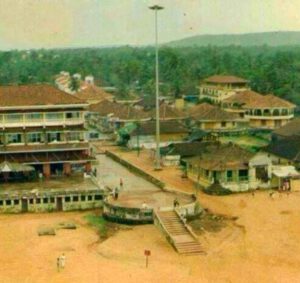 The interesting part of this mudança was the Calangute Saturday market, which had everything, like provisions, earthenware, and even livestock. Among the items we purchased, a pigling costing just Rs 20/- was something exciting to return home with. The pigling would be tied to a bamboo stick carried on the shoulders by two of my brothers. Thus, on Sunday, we could look forward to pigling cabidela or assado.
The interesting part of this mudança was the Calangute Saturday market, which had everything, like provisions, earthenware, and even livestock. Among the items we purchased, a pigling costing just Rs 20/- was something exciting to return home with. The pigling would be tied to a bamboo stick carried on the shoulders by two of my brothers. Thus, on Sunday, we could look forward to pigling cabidela or assado.
Every morning we would go to the beach and buy fresh fish, collect manddoios, shells, and just dip our feet in the water, since we were not allowed to go swimming. At times, we would stroll down to Baga beach.
We would return to the beach in the evening and join large groups of youngsters from different parts of Goa and Bombay, on their mudança. After games like dog-and-the-bone, ‘killing’ with the tennikoit ring, twos-and-threes, handkerchief, and so on, we would relax playing dumb charades, and follow it up with singing Portuguese, English and Konkani songs and medleys, to the accompaniment of one or two guitars.
Although in all those places we only had candlelight, kerosene lamps, and petromax; and had to bathe with well water heated in a big copper vessel called bann, and use the pig toilet, our mudança was always enjoyable, healthy and memorable.
The daily Rosary, followed by blessings from elders, was never missed even at the mudança.
Indeed, the true friendship, fellowship, cooperation, discipline and the immense joy of the mudança is unforgettable!
First published in Revista da Casa de Goa (Lisbon), Series II, No. 16, May-June 2022, pp. 42-45 https://casadegoa.org/revista/ii-serie-n-o-16-maio-junho-de-2022/
Banner pic: Veiga House, Maina, Curtorim, Goa (Pic courtesy: Alint Coelho)